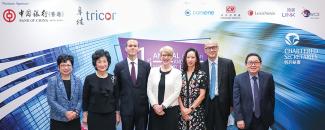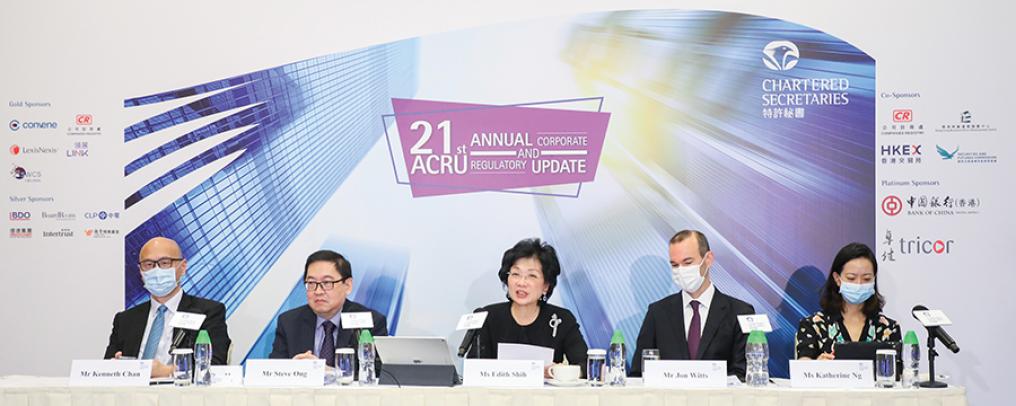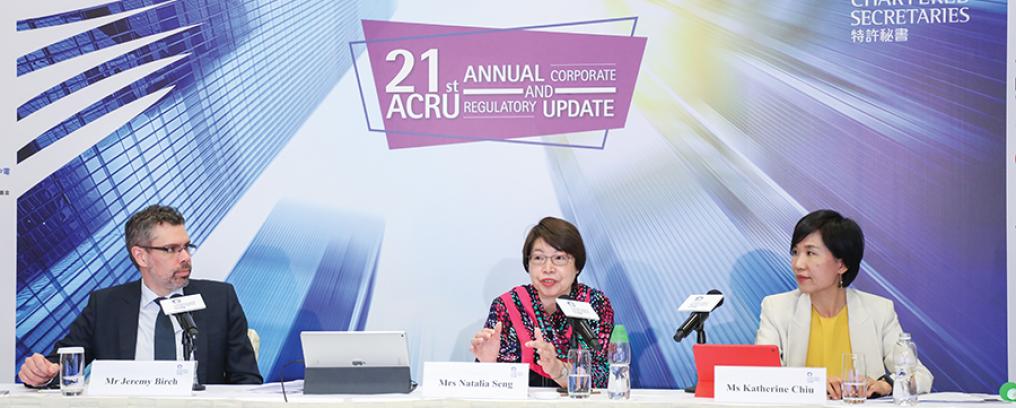Corporate disclosure issues featured highly in the discussions at this year’s Annual Corporate and Regulatory Update (ACRU). This second part of our ACRU review looks at the insights into corporate disclosure offered by regulators and practitioners speaking at the forum, in particular the disclosure lessons to be learned from the COVID-19 pandemic.
Corporate disclosure issues have been high on the agenda of companies in Hong Kong, particularly in the context of the COVID-19 outbreak. Two speakers from Hong Kong Exchanges and Clearing Ltd (HKEX) – Kenneth Chan, Senior Vice-President, Listed Issuer Regulation Listing Division, and Steve Ong FCA FCPA Senior Vice-President, Head of Accounting Affairs, Listing Division, devoted their ACRU presentations to corporate disclosure issues – in particular sharing insights on the lessons to be learned from the COVID-19 outbreak.
Disclosure lessons from COVID-19
1. Be as specific as possible
The measures taken in Hong Kong to minimise the impact of COVID-19 coincided with busiest time of the year for listed issuers – that is, when they were making final preparations for their annual reports and AGMs. The restrictions on travel and social distancing measures meant that the staff of many companies couldn’t get to the office and auditors were not able to travel to complete their field work. In this context, Mr Chan said it was a credit to those involved in corporate disclosure over the last few months in Hong Kong that only five issuers (0.3%) had to be suspended due to their failure to publish preliminary results/material financial information due to matters related to the pandemic. ‘We should be proud of ourselves that we did as well as we did and that the integrity of the market was not compromised,’ Mr Chan said.
Nevertheless, there have been disclosure lessons from the COVID-19 crisis. Mr Chan urged ACRU attendees to read the guidance issued by HKEX and the Securities and Futures Commission (SFC) on the impact of COVID-19. He referred in particular to the ‘Listed Issuer Regulation Newsletter’ (published April 2020) which makes useful recommendations on how listed issuers should approach the task of publishing announcements and providing business updates to investors.
The key message is the need to be as specific as possible in such announcements and updates. ‘The more specific you are, the more helpful the disclosure will be to shareholders,’ Mr Chan pointed out. Issuers should:
- include quantitative measures of the financial impact
- provide an assessment of cost measures and liquidity positions
- review their current liquidity position and expected financial resource needs
- disclose principal risks and uncertainties arising from the pandemic
- continuously assess and update investors of material developments, and
- disclose new business opportunities with factual information in a clear and balanced manner.
2. Disclose your judgements and estimates
Making specific disclosures in a fast-moving situation such as a global pandemic is not easy, particularly when it comes to non-financial assets. Mr Ong emphasised in his ACRU presentation that issuers should disclose their critical judgements and estimates and be particularly vigilant in areas such as any impairment assessments of non-financial assets, including goodwill.
Mr Ong pointed out that intangible assets such as goodwill are often significant assets and any impairment of these assets remains a key area of concern for investors. Issuers should take into account all of the relevant factors and disclose the key judgements made by the management in determining the useful life of an intangible asset. ‘It is critical for issuers to make sufficient disclosure with reference to Hong Kong Financial Reporting Standards (HKFRS), particularly information on management’s judgements and estimates in the preparation of the financial statements,’ Mr Ong said. He added that investors are likely to disregard companies whose assumptions are perceived to be inaccurate.
The impact of COVID-19 will differ of course depending on issuers’ specific circumstances, and Mr Ong pointed out that issuers are obliged to apply the relevant accounting standards to their particular situations. This means that issuers preparing their financial statements need to consider, with their audit committee and auditors, how COVID-19 may affect their financial results and key balances in their statements of financial position.
Mr Ong also addressed the key themes of the latest HKEX Financial Statements Review Programme (FSRP), published in January 2020. The report highlights the need for listed issuers to ensure proper assessment of recognising ‘gains on bargain purchase’. Mr Ong said there was a tendency to overestimate the ‘bargain purchases’ in M&A transactions, but that investors need to know the true value of such assets. Mr Ong reminded ACRU attendees that the SFC has issued guidance in relation to valuations in corporate transactions such as the ‘Statement on the Conduct and Duties of Directors when Considering Corporate Acquisitions or Disposals’ (issued in July 2019), and the guidance on corporate transactions and the use of valuations (issued in May 2017).
Finally, Mr Ong thanked all of the company secretaries who collated the information to enable the FSRP to be compiled. He pointed out that company secretaries are an important conduit between the board and shareholders and play a key role to ensure that financial disclosures are properly managed. ‘You have a great role to play in ensuring that the ecosystem relating to financial reporting works for listed issuers,’ Mr Ong said.
New listing rule disclosure requirements
Before the arrival of COVID-19, HKEX was in the process of upgrading the disclosure requirements of the listing rules. Rule amendments made in 2019, for example, were designed to help issuers to communicate more effectively and meaningfully with shareholders. Mr Chan highlighted some of the key changes such as the requirement for issuers to better identify their counterparties in notifiable transactions.
HKEX was concerned that some issuers were taking a ‘form over substance’ approach to disclosures with regard to notifiable transactions. Mr Chan urged issuers to consider what shareholders need to know to fully understand what is being proposed. ‘We highly encourage companies to disclose the identity of the beneficial owners of their counterparties, particularly where they are investment holding vehicles. There are cases where issuers have followed the letter of the rule but shareholders have not been provided with sufficient information to assess the transaction,’ Mr Chan said.
The 2019 listing rule changes also seek to enhance the transparency of material connected transactions. In particular, issuers are now required to disclose the identity and activities of the parties to such a transaction, as well as their ultimate beneficial owners, in both announcements and circulars.
In addition, Mr Chan pointed out that the latest HKEX ‘Review of Issuers’ Annual Report Disclosure’ highlights some weaknesses in current disclosure practices. For example the 2019 review found that around one-half of issuers assessed provided no or limited disclosure relating to ‘other expenses’ in their annual reports. Moreover, in a number of cases the unexplained ‘other expenses’ were material with reference to the issuer’s total costs and expenses for the year. He emphasised the principle that listed issuers need to provide a full discussion and analysis of the material factors underlying their results and financial position. Issuers should therefore be disclosing meaningful information by providing a breakdown of ‘other expenses’ to enhance shareholders’ understanding of their financial performance.
Mr Chan also reiterated the principle that, to enable investors to make informed investment decisions, issuers should provide shareholders with financial statements which fairly present their financial position and performance and are free from material misstatements. This means providing additional information if the financial statements do not give a true and fair view. Where issuers have included a modified audit opinion, they should take prompt actions to actively engage auditors on the action plans at the earliest instance and take actions to address the modifications.
ESG disclosure
In her ACRU presentation, Katherine Ng, Chief Operating Officer and Head of Policy and Secretariat Services, Listing Division, HKEX, gave an overview of the latest developments relating to environmental, social and governance (ESG) reporting and performance of Hong Kong listed issuers.
Ms Ng started by sketching the latest international developments in ESG, including the recommendations of the Task Force on Climate-related Financial Disclosures (TCFD). Ms Ng encouraged ACRU attendees to read the TCFD recommendations since they have become a bible for what best climate change-related disclosure looks like. She added that it is particularly relevant for governance professionals since it places a lot of emphasis on governance – the processes companies need to have in place to govern ESG and the board’s role in overseeing this area.
She pointed out that the latest HKEX ‘Analysis of Environmental, Social and Governance Practice Disclosure’ published in December 2019 found that many listed issuer ESG reports contained little or no description of board involvement. ‘Company secretaries should be focusing on the board’s role in managing ESG risks,’ she said. She shared a slide (see ‘ESG governance: assessing the board’s readiness’) listing a number of questions testing the board’s readiness for ESG governance. ‘If you take one slide takeaway from my presentation, let it be this one,’ she said. ‘Please bring these questions to your board.’
Ms Ng urged ACRU attendees to monitor the frequency by which the board and/or board committees are informed about climate-related issues, whether the board and/or board committees consider climate-related issues when reviewing business strategy and policies, and how the board monitors and oversees progress against goals and targets for addressing climate-related issues.
Ms Ng also addressed the latest upgrade to the HKEX ‘ESG Reporting Guide’. New disclosure requirements, effective for financial years commencing on or after 1 July 2020, include mandatory requirements to disclose the board’s consideration of ESG matters; the application of the reporting principles ‘materiality’, ‘quantitative’ and ‘consistency’; and an explanation of the reporting boundaries used in ESG reports.
She emphasised that early preparation before the changes become effective will be key. She urged company secretaries to familiarise themselves with the new requirements, implement any necessary changes to their reporting infrastructure, and gather the necessary information. She also pointed ACRU attendees to the relevant guidance materials available on the HKEX website.
ESG – a practitioner’s perspective
Ms Ng’s presentation was complemented by the practitioner’s perspective on ESG disclosure provided by Practitioners Sharing Session 2, chaired by David Simmonds FCIS FCS, Institute Vice-President and Group General Counsel, Chief Administrative Officer and Company Secretary, CLP Holdings Ltd. Mr Simmonds was in conversation with Flora Wang, Director, Sustainable Investing, Fidelity International.

Ms Wang pointed out that ESG concerns are now mainstream and not only confined to investors. For example, the ability of companies to attract and retain talent will depend increasingly on how they manage ESG issues. Moreover, consumers are more aware of ESG issues and less willing to buy products from companies that have a poor record on ESG. Companies that do not adopt sustainable practices will also incur increasingly high costs, whether through fines or inefficient operations and that will have a very tangible impact on their bottom lines. Put all these factors together and it is an absolute no brainer for companies to improve their ESG performance and disclosure, she said.
The discussion also addressed how to engage with boards not yet convinced about the need for better ESG disclosure and performance. Ms Wang suggested that getting boards to understand how a poor record on ESG will impact their share price is often a persuasive argument. ‘Try to get your board members to hear directly from investors about why ESG is important – let them do it for you,’ she suggested.
She shared a story a board secretary of one of the biggest Chinese state-owned enterprises told her about the effect that a road show had on the chair of the company. Being grilled on ESG issues by investors at the road show had a strong impact on him and this led to a marked improvement in their approach to ESG.
The 21st Annual Corporate and Regulatory Update (ACRU) of The Hong Kong Institute of Chartered Secretaries was held on 5 June 2020.



